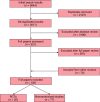Synthesis and summary of patient-reported outcome measures to inform the development of a core outcome set in colorectal cancer surgery
- PMID: 26058878
- PMCID: PMC4744711
- DOI: 10.1111/codi.13021
Synthesis and summary of patient-reported outcome measures to inform the development of a core outcome set in colorectal cancer surgery
Abstract
Aim: Patient-reported outcome (PRO) measures (PROMs) are standard measures in the assessment of colorectal cancer (CRC) treatment, but the range and complexity of available PROMs may be hindering the synthesis of evidence. This systematic review aimed to: (i) summarize PROMs in studies of CRC surgery and (ii) categorize PRO content to inform the future development of an agreed minimum 'core' outcome set to be measured in all trials.
Method: All PROMs were identified from a systematic review of prospective CRC surgical studies. The type and frequency of PROMs in each study were summarized, and the number of items documented. All items were extracted and independently categorized by content by two researchers into 'health domains', and discrepancies were discussed with a patient and expert. Domain popularity and the distribution of items were summarized.
Results: Fifty-eight different PROMs were identified from the 104 included studies. There were 23 generic, four cancer-specific, 11 disease-specific and 16 symptom-specific questionnaires, and three ad hoc measures. The most frequently used PROM was the EORTC QLQ-C30 (50 studies), and most PROMs (n = 40, 69%) were used in only one study. Detailed examination of the 50 available measures identified 917 items, which were categorized into 51 domains. The domains comprising the most items were 'anxiety' (n = 85, 9.2%), 'fatigue' (n = 67, 7.3%) and 'physical function' (n = 63, 6.9%). No domains were included in all PROMs.
Conclusion: There is major heterogeneity of PRO measurement and a wide variation in content assessed in the PROMs available for CRC. A core outcome set will improve PRO outcome measurement and reporting in CRC trials.
Keywords: Colorectal cancer; core outcome set; patient-reported outcomes; surgery; systematic review.
©2015 The Authors. Colorectal Disease published by John Wiley & Sons Ltd on behalf of Association of Coloproctology of Great Britain and Ireland.
Figures
References
-
- Speight J, Barendse SM. FDA guidance on patient reported outcomes. BMJ 2010; 340: c2921. - PubMed
-
- McNair AG, Blazeby JM. Health‐related quality‐of‐life assessment in GI cancer randomized trials: improving the impact on clinical practice. Expert Rev Pharmacoecon Outcomes Res 2009; 9: 559–67. - PubMed
-
- Parameswaran R, McNair A, Avery KN et al The role of health‐related quality of life outcomes in clinical decision making in surgery for esophageal cancer: a systematic review. Ann Surg Oncol 2008; 15: 2372–9. - PubMed
-
- Kirkham JJ, Dwan KM, Altman DG et al The impact of outcome reporting bias in randomised controlled trials on a cohort of systematic reviews. BMJ 2010; 340: c365. - PubMed
Publication types
MeSH terms
Grants and funding
LinkOut - more resources
Full Text Sources
Other Literature Sources
Medical


